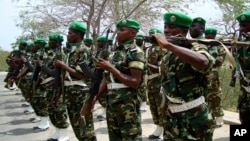The five nations contributing troops to the African Union Transition Mission in Somalia, or ATMIS, are urging the U.N. Security Council to allow a 90-day pause in the drawdown of some 3,000 peacekeepers stationed in the East African country.
Kenya, Ethiopia, Burundi, Djibouti and Uganda sent a request to the Security Council to suspend the scheduled pullout.
According to the jointly signed letter, a recent joint technical assessment illustrated a fragile situation, especially among populations within operating bases that are either being handed over to the Somali National Army or set to be closed. The assessment also raised concerns about the troops leaving the country by the end of September.
Somalia raised similar concerns in its own direct appeal to the Security Council earlier this month.
The sticking point may be the African Union, said Matt Bryden, the chairman of Sahan Research, a policy and security think tank in Kenya.
"So far, it appears that the African Union is not going to endorse the request for a delayed drawdown of the next 3,000 ATMIS forces scheduled to leave Somalia,” he said. “Without the African Union's request, since ATMIS is an African Union mission, I think it's unlikely that the U.N. Security Council will overlook the wishes, whether expressed or implicit, of the AU."
Bryden also said the Security Council might not heed Somalia’s request because the Somali government — until recently — assured the world it was ready to assume security responsibilities from ATMIS.
"These are real challenges, and I think there's no doubt that this is going to be a more difficult proposition than many had suggested that it would be,” Bryden said. “The main question on the part of Somalia's international partners, particularly those who support ATMIS or the Somali security sector, is why these problems were not identified or, in the very least, acknowledged by the Somali federal government much sooner."
Earlier this year, Security Council Resolution 2687 directed the withdrawal of ATMIS troops from Somalia — with a complete pullout by the end of 2024. This was in line with the two-year mandate for ATMIS, which began in April 2022.
Abdirizak Hussein Issack, a security expert at Hamid Bin Khalifa Civilization Center, told VOA the choice between withdrawal and delay is a balancing act for the Security Council.
“On the one hand, I think the Security Council should consider Somalia’s request,” he said. “This is because of the reality on the ground, which shows al-Shabab’s resurgence and lack of adequate preparedness by Somali forces. But a delay will also lead to laxity, leading to [an] endless stay of African Union troops in Somalia.”
President Hassan Sheikh Mohamud has been coordinating the current offensive against al-Shabab in central Somalia since August. According to the federal government, the second phase of the operation, which was set to start in July, will move to the southern parts of the country.
Analysts say this phase could face more challenges due to reduced AU troop numbers and the difficult terrain.





